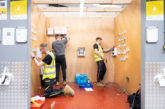
By law, employers must take steps to protect their staff at work, especially their apprentices. Kelly Friel, Digital Product Manager at Zoro, explains how you can keep your apprentices safe while on the job.
It’s estimated that around 13,000 apprentices are injured at work every year, according to a report from Direct Line for Business. The report also states that apprentices are 73% more likely to be involved in an accident compared to full-time employees. Accidents in the workplace can sometimes cause life changing injures or even death, and employers can end up receiving fines or being imprisoned for not taking care of their staff.
As an employer, you have a duty of care to all employees, especially inexperienced trainees, in compliance with the Health and Safety at Work etc. Act 1974. Below, I’ll be going through some of the main ways you can protect your apprentice while they’re on the job.
Conduct a risk assessment
Before taking on your apprentice, you should conduct a thorough risk assessment to highlight any areas of your workplace that may cause a hazard for your trainee. These hazards should be removed or fixed before the apprentice starts.
As a plumber or engineer, it’s likely that your work won’t be restricted to one place. If this is the case, your risk assessment should highlight any general hazards that could cause burns, trips and falls, and cuts. You should also consider if your staff are at risk of muscle strain from lifting heavy items. You can then put systems in place to protect your new apprentice from these kinds of injuries, such as providing sufficient Personal Protective Equipment (PPE) and training on the safest way to lift heavy objects.
Supply them with the correct PPE
PPE is essential for any manual labour job in order to protect workers from injuries. As an employer, you must supply your apprentice with all the necessary PPE and tools they’ll need to carry out the job safely. In the plumbing and heating industry, these should include trousers or coveralls, protective gloves, goggles, and boots. Head, ear and respiratory protection may also be needed when working in construction sites or when cutting or drilling pipes. If you’re working outside or at night, you may need to supply high visibility clothing, too. The Health and Safety Executive has a detailed guide to PPE, so you can identify how you can protect your trainee from specific hazards.
Supervise them at all times
Remember that your apprentice is still in training, so it’s important that you supervise them at all times. Don’t leave them to carry out a job on their own, as they may encounter risks and hazards that they’re not fully equipped to deal with properly. The best way to ensure they’re well looked after is to assign them a responsible mentor, who can talk them through the work and make sure following health and safety procedures properly.
Train them in health and safety
As part of the apprentice’s training, you should outline appropriate health and safety procedures that will need to be adhered to throughout the job. These should include how to wear PPE correctly, how to recognise and control hazards and how to use equipment safely to reduce the risk of injury. Trainees should be aware of the kinds of hazards they may face while working and how to protect themselves from them before they start.
Encourage communication
Aside from physical protection, it’s also worth providing support for mental health. If your apprentice is not showing up to work on time or becoming agitated easily, it may be difficult as an employer, but these behaviours could be signs of an underlying issue.
Make sure that your apprentice is aware that they can come to you or their mentor with any issues they may have so that they can feel comfortable knowing they’re in a supportive environment. Try to put systems in place to promote a positive working culture and focus on wellbeing, such as flexible working arrangements and social events out of hours.
If you’re an understanding boss, you’ll have a loyal, hardworking employee in no time!
It’s important that you always have steps in place to protect your employees. And, when it comes to apprentices, their inexperience means they’re more at risk of accidents and injuries. Luckily, the tips in this guide will help you keep your trainees safe while on a job.













